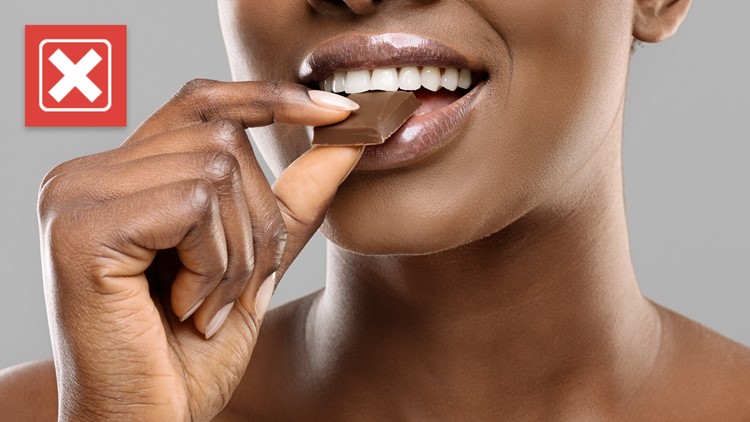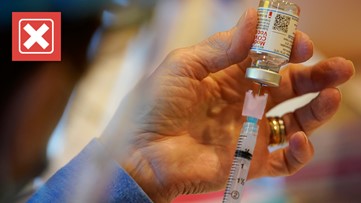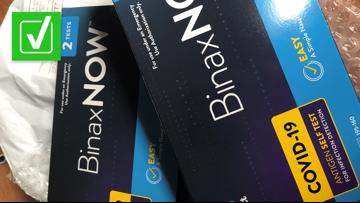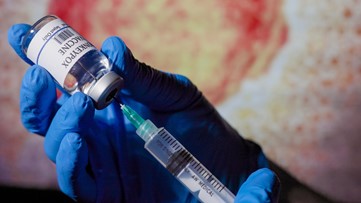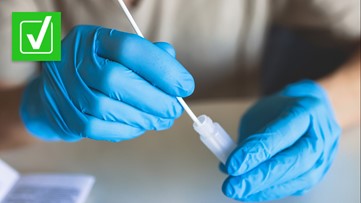More than 37 percent of the US population has been fully vaccinated from COVID-19, according to the CDC, but many people have concerns about vaccine side effects, which can include some short-term symptoms similar to those of COVID-19, such as fever and chills.
VERIFY viewer Sandra asked if the COVID-19 vaccine could cause someone to lose their sense of taste.
THE QUESTION
Does the COVID-19 vaccine cause you to lose your sense of taste or smell?
THE SOURCES
- Centers for Disease Control and Prevention (CDC)
- Dr. Payal Kohli, MD, assistant clinical professor of medicine at University of Colorado Anschutz medical campus
THE ANSWER
No, there is no evidence the COVID-19 vaccine causes loss of taste or smell.
WHAT WE FOUND
New loss of smell (anosmia/hyposmia) and taste (dysgeusia) are symptoms and early indicators of COVID-19. Despite it being a symptom of the virus, the CDC had not received any reports of it being a side effect of receiving the vaccine, a CDC spokesperson told VERIFY.
Common side effects of the vaccine include pain, redness and swelling on the arm where the shot was administered, and throughout the rest of the body:
- Tiredness
- Headache
- Muscle pain
- Chills
- Fever
- Nausea
Those side effects are also symptoms of COVID-19.
Dr. Payal Kohli, assistant clinical professor of medicine at the University of Colorado Anschutz medical campus, told VERIFY the loss of taste or smell is likely not a side effect of the COVID-19 vaccine because the live virus does not get injected with the vaccine.
She also said some vaccinated people did experience a “metallic” taste after receiving the vaccine, but that is not uncommon with any vaccine and is temporary.
“There have been a few anecdotal case reports of a metallic taste occurring in the mouth after receiving the Messenger RNA vaccine. People say it tastes kind of like you’re eating a bunch of nickels or something, and this is temporary. It goes away and this has been reported with other vaccines as well, just a little alteration in the sense of taste that is very short-lived and temporary while the immune system is activated and usually resolves with time,” she told VERIFY.
The most common side effect of the vaccine is a sore arm at the injection site, Kohli said, and any other side effects are similar to what someone might experience with any vaccine.
“If you think about what a vaccine is doing it’s teaching your immune system how to fight, so the side effects and symptoms you’re going to have regardless of who you’re fighting are going to be many of the same things,” she said.
“You’re going to feel muscle aches, you’re going to feel fatigued, you’re going to feel headaches, you might have a fever, a low-grade fever, you might feel under the weather. Many of the symptoms we are seeing are very much expected with what we would see after most or any vaccinations, including the duration of how long those symptoms are lasting.”
The CDC has monitoring activities in place, like v-safe, that will follow patients up to a year after vaccination. Public Affairs Specialist Jade Fulce said: “This will give us a better understanding of possible long-term adverse reactions to COVID-19 vaccines. So far, we have not seen any unusual or unexpected patterns in our safety monitoring.”
V-safe is an “after vaccination health checker” for vaccinated people to tell the CDC how they are feeling for up to a year after receiving the vaccine. A person would have to enroll in v-safe from their smartphone and is not automatically enrolled after receiving the vaccine.
More from VERIFY: Yes, a sudden loss of smell or taste might be an indicator of COVID-19
VERIFY
Our journalists work to separate fact from fiction so that you can understand what is true and false online. Please consider subscribing to our daily newsletter, text alerts and our YouTube channel. You can also follow us on Snapchat, Twitter, Instagram or Facebook.

